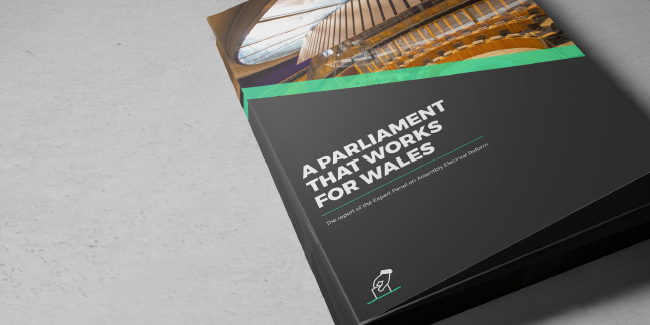The
Expert Panel on Assembly Electoral Reform, following a forensic analysis of evidence, is recommending that the Assembly needs between
20 and 30 additional Members elected through a
more proportional electoral system with
accountability to electors and diversity at its heart. It also recommends
lowering the minimum voting age for National Assembly elections to include
sixteen and seventeen year olds.
A Parliament that Works for Wales
The report of the Expert Panel on Assembly Electoral Reform (PDF, 6.81 MB)

Making laws and holding the Welsh Government to account
Today's Assembly is a very different institution to the one established in 1999. Then, it had no primary law-making powers and was not formally separated from the Welsh Government; now, it has responsibility for making laws and holding the Welsh Government to account in some of the areas which have the greatest impact on people's lives. Soon, it will be operating on the basis of a new reserved powers model under the Wales Act 2017, with responsibilities for the first Welsh taxes in 800 years, including income tax-varying powers.
The Panel's report describes the crucial roles that Assembly Members play in championing constituents' interests and holding the Welsh Government to account; challenging its decisions, spending, legislation and policy. Fulfilling these roles more effectively can save money and deliver real benefits to people and their communities.
Yet it concludes that, despite significant steps that have already been taken to increase capacity, a 60 Member Assembly cannot continue as it is without risking its ability to deliver for the people and the communities it serves.
Electing Assembly Members
On the question of electing Assembly Members, the Panel identified key principles against which it evaluated a wide range of different systems. The Panel's preferred option, if its recommendation for an integrated gender quota is implemented, is Single Transferable Vote. Flexible List Proportional Representation would offer a viable alternative. An option based on the current Mixed Member Proportional (Additional Member) system, offering the least change, has also been outlined, but with the limitation of a maximum Assembly size of 80 Members in 2021.
The Panel considered how the Assembly's world-leading reputation on gender representation could be safeguarded and how the electoral arrangements could encourage greater diversity.
The Panel recommends that:
a gender quota should be integrated into the Assembly's electoral arrangements;
the Assembly should require political parties to publish diversity data on their candidate selections;
electoral law and Assembly procedures should be changed to allow candidates to stand for election on the basis of transparent job share arrangements, with no additional costs beyond those of a single Assembly Member. This would help remove barriers which can prevent people with disabilities or caring responsibilities from standing for election.
Votes at 16
The Panel has reviewed evidence relating to the minimum voting age, and concluded that votes at 16 could be a powerful way to raise political awareness and participation among young people; but this must be accompanied by appropriate political and citizenship education.
Meet the panel

(L-R: Rob Clements,
Professor David Farrell, Professor Laura McAllister CBE, Sir Evan Paul Silk KCB, Dr Alan Renwick, Professor Rosie Campbell. Not pictured: Professor Sarah Childs.)
The Panel have a wealth of expertise in the fields of electoral systems, parliamentary work and capacity, the constitutional position of the National Assembly, and wider issues of governance, including equalities, diversity and engagement.
Professor Laura McAllister CBE of the Wales Governance Centre, Cardiff University and Chair of the Expert Panel on Assembly Electoral Reform said:
"Our recommendations are designed to ensure that the Assembly has the number of Members it needs to effectively represent the people and communities it serves, hold the Welsh Government to account, and be a parliament that truly works for Wales now and in the future.
"In 1999, Assembly Members had very little scope to affect the daily lives of people in Wales. Today, they are responsible for a budget of £15 billion, they make the law in Wales in a host of important areas such as health and education, and they can change the taxes we pay. Today's institution still has only sixty Members and, with its increasing powers to affect people's lives, it lacks the capacity it needs.
"This matters. The Assembly and its Members have a real, direct and positive impact on the lives of every one of us in Wales. Calling for more politicians is unpopular; but we have to report as we see the evidence. The Panel believes that, as its powers increase, the Assembly cannot continue as it is without risking its ability to deliver effectively for the people of Wales. There is a compelling case for an increase in size to at least 80, and ideally closer to 90 Members. There is no good time to remedy this. However, if this is not done now, the Assembly will continue to be undersized, presenting a risk to its ability to deliver for the people it serves."
Elin Jones AM, Llywydd of the National Assembly for Wales, said:
Read the full statement from the Llywydd Elin Jones AM"In 2015, the previous Assembly Commission concluded that with only 60 Members, the National Assembly is underpowered and overstretched. They were far from the first to do so. For over a decade, independent commissions tasked with looking at the capacity of the Assembly have reached the same conclusion. This lack of capacity will not be resolved without bold action, and we cannot afford to ignore it any longer.
"This report presents considered, independent analysis of the evidence and possible solutions to create a more sustainable parliament that serves the people of Wales well into the future. I am thankful to the Panel members for their time, to Professor McAllister for her leadership, and to the Panel for delivering such a rigorous, evidence based contribution to democracy in Wales.
"The Assembly Commission will consider the proposals in detail over the coming months and engage with people across the country and the political spectrum. I hope we can find a broad consensus for change and deliver a stronger, more inclusive and forward-looking legislature that works for Wales for many years to come."

